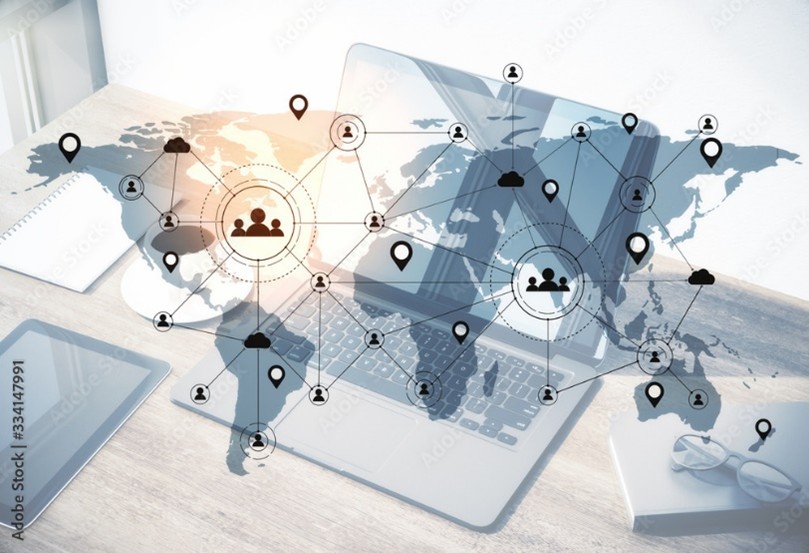
In Cyprus, more professionals, especially in tech, are embracing flexible work arrangements, prompting leaders to rethink how they manage performance.
Introduction
Optimizing Performance Management in Remote and Hybrid Work in Cyprus. Remote and hybrid work have redefined how organizations operate, bringing both opportunities and challenges. Globally, over 80% of companies now accommodate remote work, but Cyprus has been slower to adapt. In 2021 only about 6.7% of Cypriot professionals worked remotely – roughly half the EU average fastforward.com.cy. This is changing, however, especially in the island’s thriving fintech and tech sectors. A 2023 survey found 47.4% of Cypriot professionals favor remote work (versus 24.1% who prefer the office) fastforward.com.cy.
Tech firms are leading the way:
“The tech industry is at the forefront of remote work” in Cyprus rideogroup.com. At the same time, many local business leaders still value face-to-face interaction; about 35% of Cypriot respondents believe in-person communication positively impacts work performance fastforward.com.cy. This dynamic creates a unique management challenge: how to maintain productivity and accountability across distributed teams, while building an inclusive culture that works for both traditional and modern mindsets.
In this article:
We explore strategies for Optimizing Performance Management in Remote and Hybrid Work, with a focus on Cyprus. Aimed at HR professionals, managers, and business leaders, the insights below offer a conversational yet data-driven look at how to keep teams productive, engaged, and growing, no matter where they’re located. We’ll cover how to maintain high performance and engagement across distributed teams, build a culture of accountability regardless of location, leverage data-driven insights to support employee growth, and implement inclusive practices in hybrid environments. Each section includes actionable tips and examples to help Cyprus-based organizations navigate the transition from traditional to modern management styles.
Maintaining Productivity and Engagement Across Distributed Teams
Ensuring productivity and engagement in a distributed team starts with understanding the risks of disconnection. Remote employees can easily feel isolated or “out of the loop,” which can sap motivation and performance. Studies note that without proactive effort, remote employees may become disconnected from colleagues and the organization, leading to drops in engagement betterworks.com. To combat this, managers should increase structured communication. Frequent check-ins and updates help remote staff stay anchored to the team, giving them regular opportunities to discuss progress, challenges, and ideas. In fact, frequent contact with managers and peers has been shown to improve engagement and even reduce turnover among remote employees betterworks.com.
There are several practical ways to maintain a high-performing, engaged remote or hybrid team when optimizing performance management in Remote and Hybrid Work in Cyprus:

Set Clear Goals and Expectations:
Every team member should know what they’re responsible for and how it ties into broader company objectives. Goal clarity is essential for successful remote performance management betterworks.com. For example, at the start of each quarter, collaboratively set individual goals (OKRs or KPIs) that align with the company’s strategy. Make sure to define what success looks like for each goal so employees understand how their output will be measured.
Adopt Regular Check-Ins:
In an office, quick feedback or guidance often happens informally. In a remote setting, those moments must be planned. Many Cyprus firms schedule weekly one-on-ones or team huddles via GoogleMeet/MS Teams to replicate the feedback loop. Adopting a frequent feedback model, with ongoing check-in conversations rather than waiting for annual reviews, keeps everyone on track betterworks.combetterworks.com. These discussions should be purpose-driven and constructive (avoiding the feeling of micromanagement) and allow employees to voice concerns and achievements.
Keep Teams Connected Socially:
Don’t underestimate the power of camaraderie in boosting performance. Organize virtual team-building activities and informal meetups. For instance, some companies in Cyprus hold a “virtual coffee chat” each Friday or celebrate team wins with online gatherings. Such virtual team-building activities remind employees that everyone’s working toward a shared goal, even if they aren’t in the same location betterworks.com. Personal check-ins, like starting meetings with a bit of non-work banter or acknowledging birthdays and milestones also help sustain a sense of community.
Recognize and Celebrate Achievements:
In distributed teams, accomplishments can sometimes go unnoticed. Managers should make a point to recognize good performance publicly on company communication channels (like Slack or an intranet) so remote employees feel appreciated. Small gestures such as e-certificates, shout-outs in meetings, or sending a thank-you email from the CEO can boost morale. Engaged employees who feel valued tend to be more productive and are less likely to disengage.
It’s worth noting that many of these practices benefit all work arrangements, not just remote. By keeping communication channels open and focusing on engagement, Cyprus based organizations can turn the flexibility of remote/hybrid work into a productivity advantage. In fact, remote work done right can offer flexibility, reduce costs, and even augment productivity fastforward.com.cy. For example, an extensive study at a large company found that a hybrid schedule increased productivity by around 1% and led to higher employee satisfaction, all while cutting attrition rates by 35% hbr.org. The key is being intentional: proactively connecting with team members and creating an environment where people can do their best work regardless of location.
Building a Culture of Accountability Regardless of Location

A common concern among managers in Cyprus new to remote work is: “How do I know my employees are actually working?” This speaks to a need for accountability in a culture where physical presence used to be the proxy for productivity. In a hybrid or remote context, organizations must shift their mindset to trust and outcomes. As one expert bluntly put it, “Good managers don’t need to see their reports in action to know that people are working.” Instead, effective leaders focus on results betterworks.com. In other words, what an employee achieves is far more important than where they work or how many hours they spend at their desk.
To build a culture of accountability across locations, consider these strategies:
Focus on Outcome-Based Performance:
Transition from measuring inputs (hours online, office attendance) to measuring outputs (goals achieved, quality of work). For example, if a software developer delivers a feature on time with high quality, it shouldn’t matter if they did it from an office in Limassol or a home office in Paphos. Managers should be trained to assess performance using concrete, measurable metrics tied to business objectives betterworks.com. This shift to outcome-based evaluations reinforces that everyone is accountable for results, regardless of location. It also helps overcome any lingering bias that in-office staff are “working harder” simply by being seen.
Set and Communicate Accountability Norms:
In a distributed team, make it explicit how you’ll track progress. Use shared project management tools (Trello, Jira, Asana, etc.) where tasks and deadlines are visible to all. This transparency creates a subtle peer accountability, everyone can see what their colleagues are working on and when deliverables are due. It also helps distributed team members self-manage; they understand their responsibilities and deadlines without needing constant supervision.
Establish Regular Reporting Cadences:
Implement weekly or bi-weekly progress updates. For instance, some companies use Monday morning briefings or end-of-week reports where each employee lists key accomplishments, upcoming tasks, and any blockers. This practice works equally well for in-office and remote staff, ensuring no one falls off the radar. It builds a rhythm of accountability, as employees come prepared to discuss their contributions and managers can offer support or course-correction promptly.
Encourage Ownership and Trust:
Building accountability also involves trust from leadership. Micromanagement can backfire in remote settings, harming morale. Instead, encourage employees to take ownership of their work. Set clear expectations (the “what” and the “why”), then give individuals autonomy in the “how.” Trusting your team until proven otherwise creates a positive pressure – people generally don’t want to let down a boss who trusts them. One way to reinforce this is to publicly highlight examples of remote employees exercising great ownership (e.g., “Maria took initiative to resolve a client issue from home and saved the deal”). Storytelling can solidify what accountable behavior looks like in your culture.
Proven Ways to Boost Connection Across Distributed Teams

It’s important to tackle the psychological shift here: managers might feel they are losing control when they can’t physically observe employees. This is a training opportunity. Research indicates that remote work “can lead to managers lacking trust in their workers or feeling they can’t hold them accountable” if they rely on old management habits betterworks.com. Cyprus organizations in more traditional industries may need to invest in manager training to overcome this. Teach leaders how to use data and regular check-ins (as discussed) to replace the old “management by walking around.” Over time, when managers see that deliverables are still being met and even exceeded, their confidence in remote accountability will grow.
Finally, emphasize that accountability is a two-way street. While employees are accountable for meeting their goals, organizations are accountable for providing the necessary support and clarity. This means ensuring remote staff have access to the information, tools, and help they need. By creating a supportive environment that still expects high performance, you strike the balance between flexibility and responsibility. Employees understand that working from home is not an allowance to slack off; rather, it’s a flexibility that comes with clearly outlined performance expectations.
Leveraging Data-Driven Insights to Support Growth and Performance
In the digital age, performance management should be as data-driven as any other business function. When teams are spread across various locations – from Nicosia to remote home offices abroad – gut feel alone isn’t enough to gauge how people are doing. Progressive organizations in Cyprus are turning to people analytics and modern HR tools to get a fuller picture of employee performance and to support their development. Leveraging data helps remove bias and ensures decisions about promotions, rewards, or interventions are based on evidence rather than who is most visible or vocal.

One illustrative example comes from a large global company, Trip.com, which experimented with hybrid work. A key ingredient of their success was a “rigorous performance management system” with frequent evaluations and multi-source feedback hbr.org. Instead of managers hovering over employees, Trip.com uses extensive performance reviews every six months that incorporate data from multiple sources: objective performance metrics, self-assessments, and 360-degree feedback from colleagues, clients, and direct reports hbr.org. This data-driven approach allowed them to quickly identify who was performing well and who needed support, even when half the staff was remote. The result was that hybrid teams remained as productive and even more satisfied than fully in-office ones hbr.org.
Cyprus companies can take a page from this playbook. Here are some data-driven practices to consider:
Implement Modern Performance Management Software:
Tools like BambooHR, or HiBob (which some firms on the island are already exploring) enable continuous performance tracking. They allow managers and employees to record goals, give real-time feedback, and capture accomplishments. Over time, these systems generate data dashboards – for example, showing an employee’s goal completion rate, skills acquired, feedback received, and engagement survey scores. Such data helps in making objective decisions and tailoring personal development plans. As an added benefit, one study noted that having well-documented check-ins makes formal evaluations much easier and more fair betterworks.com. A central system means nothing falls through the cracks, even if manager-employee interactions happen over email or video calls.

Use Analytics to Identify Trends:
Aggregate data can reveal team or company-wide trends that might be invisible anecdotally. For instance, you might discover that a particular department’s productivity dips every Friday (perhaps due to a poorly timed meeting or deadline). Or analytics might show remote hires ramp up slower than in-office ones, indicating a need to bolster your virtual onboarding and training. By analyzing performance metrics and engagement surveys, HR can spot patterns early and intervene. Maybe the data shows that employees working from home more than 3 days a week have slightly lower engagement – a cue to organize occasional in-person meetups or extra manager check-ins for those staff.
Tie Performance to Employee Development:
Data should not be used only for evaluation, but also for growth. A data-driven manager will, for example, track what types of projects an employee has excelled in and which ones posed challenges. This insight can guide personalized coaching. If an employee’s data shows strong technical output but lower scores on teamwork (perhaps via peer feedback), the manager can arrange mentorship or training to build collaboration skills. Essentially, let the data tell a story about each employee. Then have honest developmental conversations around that story. Employees often appreciate this approach, as it feels less personal and more constructive, “the data suggests you excel in X but struggle in Y, let’s work on Y together” is easier to digest than a vague “I think you need to improve your communication.”
Measure What Matters (and Be Transparent):
Determine a handful of key performance indicators (KPIs) or objectives for each role that truly reflect success. Common metrics in a sales role might be deals closed or revenue; in customer support, resolution time and customer satisfaction scores; in software development, perhaps code quality and sprint completion rate. By quantifying these, employees know exactly what the target is. Be transparent by sharing how performance is measured and how it ties to rewards or advancement. This clarity can be very motivating and fair. It also reinforces accountability: when a remote employee knows their performance is being measured by data (and not by whether their manager saw them working late), they’re incentivized to focus on producing great results that show up in the reports.
Importantly, ensure data is used to support and not to spy. There’s a fine line between insightful analytics and intrusive surveillance. Avoid metrics like “hours active online” or constant screen monitoring, which can erode trust and skew behavior. Instead, stick to outcome-centric data. The goal is to create a feedback loop where data informs better management decisions and helps employees grow. When employees see that decisions about raises or promotions are backed up by clear evidence (e.g. achievement of targets, skill progression, client feedback), it increases their trust in the system and their willingness to buy into performance management processes.
Implementing Inclusive Practices for Hybrid Work
Inclusivity in a hybrid workplace means ensuring everyone has equal opportunity to participate, perform, and progress, whether they work on-site or remotely. This is particularly relevant in Cyprus as companies blend traditional in-office cultures with modern remote practices. Without conscious effort, it’s easy for remote employees to feel like second-class citizens – missing out on impromptu discussions, being last to know information, or being overlooked for opportunities. To prevent this, organizations must deliberately design their culture and processes to be location-agnostic.
First, it’s essential to recognize that bias can creep in. Managers might (often unconsciously) favor employees they see in person more often a phenomenon known as proximity bias. To counteract this, adopt a simple rule: when evaluating performance or potential, ask whether you’re focusing on outcomes and skills or just on familiarity. Many HR leaders now conduct calibration meetings in which they review performance ratings for signs of bias (for instance, if all the top ratings in a team went to people who are mostly in-office, that warrants a discussion). This helps enforce fairness and keeps remote staff from being sidelined.
Cyprus’s new Remote Working Law of 2023 reinforces this principle by explicitly prohibiting discrimination against remote workers. Employers must ensure that choosing to work remotely (or not) does not result in unfavorable treatment cyprus-mail.com. In practical terms, that means remote employees should have access to the same opportunities for training, promotions, high-visibility projects, and rewards as their office-based peers. HR can audit participation in programs – for example, if there’s a leadership training course, check that remote staff are not underrepresented among attendees. If they are, take steps to invite and include them.
Here are some inclusive practices to implement in a hybrid setting:
Level the Playing Field in Meetings:
One actionable approach is the “one remote, all remote” policy for meetings. If even one person is joining virtually, have everyone log into the meeting platform individually (even if some colleagues are sitting in the office). This way, all participants have the same interface and ability to speak up, rather than remote attendees being a distant voice in a conference room speaker. Ensure tools like Zoom or Microsoft Teams are used effectively – encourage use of features like hand-raising, polling, or chat so everyone can contribute. Additionally, rotate meeting times if you have team members in different time zones, so the same people aren’t always inconvenienced.
Inclusive Communication Channels:
Rely on digital communication channels for work-related info as a default. For instance, important announcements should be made via company-wide email or a platform like Slack/Teams rather than only in a physical all-hands. Documentation is another ally of inclusion – maintain shared records of decisions, meeting notes, and knowledge (using tools like Confluence or SharePoint) so remote folks can asynchronously catch up on anything they missed. By creating a single source of truth accessible from anywhere, you avoid the “watercooler effect” where only those present in the office hear the news.
Encourage Social Inclusion:
Just as crucial as formal meetings are the informal interactions that build rapport. In a hybrid team, you might have a mix of people who see each other in person and those who don’t. Bridge this gap by facilitating casual virtual interactions. Set up a #random or #wellbeing channel in Slack for sharing personal updates, photos, or weekend stories. Organize hybrid social events – for example, when the team goes out for a lunch in Nicosia, have a video call open for remote colleagues to join and chat during dessert, or send them a voucher to order lunch simultaneously. It might feel a bit contrived, but these gestures go a long way to ensure everyone feels part of the team fabric.
Provide Equal Support and Resources:
Ensure remote workers have what they need to be effective. This could mean providing a stipend or equipment (second monitor, ergonomic chair, high-speed internet reimbursement) so their home setup is on par with an office setup. The new legislation in Cyprus actually requires employers to cover certain costs for remote staff and provide necessary equipment and support cyprus-mail.comcyprus-mail.com. Following these guidelines not only keeps you compliant but also shows employees you’re investing in their success regardless of location. Similarly, consider offering flexibility to office-based employees to occasionally work from home, so that remote work is normalized and not seen as a special privilege for a few.

Lastly, cultivate a culture where remote and in-office colleagues are seen as one team. Leadership should communicate and model that performance and contribution are what count – not where someone works from. Celebrate team successes without highlighting who was in office vs remote. When introducing new hires, mention what they’ll be working on (their role and expertise) before mentioning their work arrangement, if at all. Over time, the goal is to have location become almost an afterthought in day-to-day operations. Employees should feel confident that “out of sight” does not mean “out of mind” when it comes to their career progression.
By implementing these inclusive practices, Cypriot businesses can build a culture of belonging that spans offices and home offices alike. This is not only good management practice – it’s also increasingly expected. Talented employees, especially in tech and fintech, will gravitate toward organizations where they feel they have equal opportunity to shine, no matter where they work. Inclusivity thus becomes a competitive advantage in attracting and retaining the best people in a hybrid world.
Conclusion
The rise of remote and hybrid work in Cyprus presents an opportunity for organizations to modernize their performance management for the better. By focusing on productivity and engagement, accountability, data-driven insight, and inclusion, companies can create a high-performance culture that transcends physical distance. This evolution is supported by both data and real-world examples: research shows well-structured hybrid teams can maintain or even improve productivity and retention hbr.org, and local trends indicate employees are ready for more flexible work models fastforward.com.cyfastforward.com.cy.
For HR leaders and managers in Cyprus:
The task now is to put these strategies into action. Start with clear communication of goals and expectations, reinforce a results-oriented mindset, and invest in tools that provide visibility into performance. Train your managers to coach remote teams effectively, using frequent feedback and empathy. Regularly analyze the data – what is it telling you about your team’s productivity, engagement, or needs? Use those insights to refine your approach continuously. And always check your policies and norms through an inclusion lens: are we being fair and supportive to everyone, regardless of work location?
The transition from traditional to hybrid management won’t happen overnight. There may be setbacks or resistance, especially in organizations steeped in conventional office culture. However, the momentum is clearly toward flexibility. As one Cyprus commentary noted, the challenge ahead is “finding the right balance” between the merits of remote work and the intrinsic human need for connection fastforward.com.cy. By optimizing how you manage performance now, you set your organization up to thrive in that balance. The companies that get it right will enjoy not only sustained performance and engagement, but also a reputation as forward-thinking employers of choice in the Cyprus market.
In summary
Remote and hybrid work are here to stay, and performance management practices must evolve accordingly. With thoughtful implementation of the strategies discussed – from regular virtual check-ins and outcome-focused goals to leveraging performance analytics and ensuring no employee is left behind – Cyprus businesses can maintain productivity and build a culture of accountability and growth that shines wherever work happens. The result is a win-win: employees feel empowered and supported to do their best work, and organizations achieve the high-performance outcomes they need in today’s competitive, distributed world.
Sources: The insights and recommendations above draw on a range of recent studies, expert analyses, and local Cyprus developments in the world of work, including the Cyprus Remote Working Law cyprus-mail.com, surveys on remote work trends fastforward.com.cy, industry reports on hybrid productivity hbr.org, and best practices from HR thought leaders betterworks.combetterworks.com. These sources underscore the central message: performance management in the age of remote and hybrid work is entirely achievable and when done right, it can lead to more engaged employees and stronger business results than ever before.




